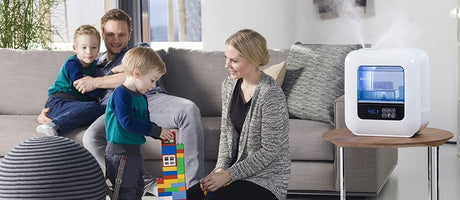What Do Humidifiers Do and How Do They Work?
We’ve all heard of “humidifiers”, but what does a humidifier do exactly? Even today, many homeowners mistakenly buy diffusers or purifiers instead.
Unlike a diffuser (which releases essential oils) or a purifier (which removes pollutants), a humidifier’s sole purpose is to add moisture to your indoor air with vapor.
This is particularly useful in dry climates where indoor air drops below 30–40% relative humidity. Even then, humidifiers come in many varieties. You can get cool mist, warm mist, ultrasonic, or even evaporative air humidifier devices.
Common Problems Humidifiers Help Solve
Humidifiers don’t just make dry air more comfortable. There’s a huge number of humidifier benefits science now understands, including relief from:
- Dry skin and irritated sinuses from low humidity.
- Scratchy throats and dry eyes from dry indoor environments.
- Worsened allergy or asthma symptoms.
- Cracking wood furniture and floors due to overly dry air.
- Poor sleep quality due to congestion.
Does any of these sound familiar? An air humidifier is a proven way to tackle these problems!
Types of Humidifiers
You can start taking advantage of proven humidifier benefits right now. Before you make your decision, though, ensure sure you’re getting the humidifier that best suits your needs:
- Cool mist humidifiers: Discreet room humidifiers with no heated element. Easy and ideal options for year-round use in family homes and nurseries.
- Warm mist humidifiers: For added relaxation, try a humidifier that provides a soothing, heated mist. Perfect for cold winters and clearing up colds.
- Ultrasonic humidifiers: Specially designed to be ultra-quiet and are great for bedrooms and offices. These use imperceptible vibrations to create a fine mist.
- Evaporative humidifiers: Naturally self-regulating humidifiers that use a smart fan to evaporate water into the air.
- Whole-house/console units: Larger tanks, higher output. Engineered for continuous operation in large spaces like whole homes or commercial buildings.
- Steam humidifiers: Reliable devices that boil water to produce moisture vapor for your room or office.
As you can see, we don’t just supply humidifiers, we supply the perfect humidifier for your needs. Take the time to explore your options and while you’re there, consider extra elements like filter vs. filter-free models, runtime, and auto shut-off features for your convenience.
Why Buy Your Humidifier from Sylvane?
Sylvane has always gone one step further. We’re not content to simply sell humidifiers. We want to assist every customer in finding the perfect home comfort solution that will serve them for years to come.
So, you’ll not only find leading home humidifier brands like Aprilaire, Honeywell, AIRCARE, and Objecto at Sylvane, you’ll also find reams of handy resources to help you shop smart, including expert guides and sizing tools!
Our U.S.-based customer support team is also on hand to give you personalized advice whenever you need it, whether you want to discuss setup or health concerns or anything in-between.
Plus enjoy fast shipping and super warranty on every Sylvane order.
Humidifier FAQs
What size humidifier do I need for my room?
The main factor is the square footage of the space. You'll generally only need a 0.5–1 gallon tank for up to 300 sq ft or 1–2 gallons for 300–500 sq ft. You'll need 2+ gallons or a whole-home unit for 500+ sq ft.
Is a cool mist or warm mist better for my needs?
Warm mist is superb for soothing pesky colds. But cold mist is generally safer for people with children and pets as there's no heat.
How often should I clean or refill the humidifier?
You’ll probably need to refill a standard humidifier daily if you’re using it a lot. Cleaning doesn't have to be a chore. The occasional deep clean may be necessary, but a daily rinse can go a long way!
Can I use tap water or do I need distilled water?
Tap water is usually fine. But it can lead to deposits or bacterial growth over time. Distilled water is generally better for preventing mineral buildup.
Are humidifiers safe for children and pets?
Yes, as long as they’re kept out of reach and cleaned regularly. That said, warm mist humidifiers can pose a burn risk.
What humidity level should I aim for?
30%–50% indoor air humidity is generally considered ideal.
Can I use essential oils in my humidifier?
Only if it’s designed for it! Most humidifiers aren’t. For that, use a diffuser instead.
